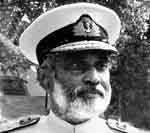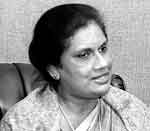Three Judges
to probe arms deals
A three-member Commission comprising Supreme Court
judges has been appointed by President Mahinda Rajapaksa to probe
defence procurements and services obtained by the military during
a five-year period beginning from 2000.
This Commission appointed under the Commissions of Inquiry Act is
headed by Justice Shiranee Tilakawardane and includes Justices N.K.
Udalagama and N.E. Dissanayake.
 |
| Chief of Defence Staff Daya Sandagiri |
Another one-man Commission of Inquiry comprising
Supreme Court Judge Gamini Ameratunga was earlier appointed to probe
procurements of high value weapons, military equipment, material
and services obtained by the Sri Lanka Navy between 2001 and 2005.
This was the period when the present Chief of Defence Staff Daya
Sandagiri was the Navy Commander.
This Commission had heard public representations until April 17
and The Sunday Times learns it was now collating the evidence received
and thereafter would fix dates for the start of a formal inquiry.
Many senior navy officers have requested assurances against possible
reprisals since Admiral Sandagiri -- even despite serious allegations
against him -- continues to function as Chief of Defence Staff,
the topmost position in the nation’s security establishment.
 |
| Former President Chandrika Kumaratunga |
The Sunday Times learns that this matter is now
receiving the attention of the Government at the highest levels.
Edmund Jayasuriya -- a retired senior officer of the Sri Lanka Administrative
Service -- will function as Secretary of both Commissions of Inquiry
and he told The Sunday Times that the two Commissions would conduct
its sessions in camera.
The three-member Commission of Inquiry has been mandated to probe
the procurement of high-value weapons, military equipment and services
by the Army, Navy, Air Force, Police and other agencies.
Of particular significance would be the probe into the period between
2000 and 2002 – this is in the aftermath of the military debacles
of 1999 -- when according to allegations a series of questionable
military procurements were made. But since 2002 when the ceasefire
agreement between the government and the LTTE took effect, the volume
of procurements was much less.
The period being probed by the two Commissions of Inquiry covers
the tenure of office of President Chandrika Bandaranaike Kumaratunga
when she was also Defence Minister and Commander-in-Chief of the
Armed Forces.
Following are the terms-of-reference of the three-member Commission
of Inquiry:
Was there a proper documented procedure followed to appraise and
identify the need to make the relevant procurement, and what were
the modalities of the said procedure?
Was due approval obtained from the proper Approving Authority for
the relevant procurement?
What were the modalities of the tender procedure followed for the
relevant procurement?
Have the guidelines on government tender procedure been followed
to ensure a transparent, expeditious and financially and qualitatively
advantageous transaction on behalf of the government.
If the said guidelines have not been followed, in what manner were
they deviated from, were there legitimate and compelling objectives
which justified such deviation and were those objectives achieved?
Have there been any instances where duly awarded tenders been cancelled
or suspended and if so, on whose authority were such tenders cancelled
or suspended and were there legitimate and cogent reasons for such
cancellations or suspensions?
Was there a proper documented inspection procedure followed, prior
to shipment and/or confirmation of Letter-of-Award, to appraise
the relevant weapons, other military equipments and materials as
to age and condition of the product and/or capacity to provide the
relevant services and what were the modalities of the said procedure?
What were the observations/recommendations of the Inspectors, were
they given effect to and if not, were there legitimate and cogent
reasons to override the said observations/recommendations?
Were the Contracts and/or Agreements entered into for the relevant
procurement subjected to proper scrutiny and/or expert advice to
ensure optimum advantage to the Government in areas including age
and conditions of product, warranty, training, technical support,
after sales service and conformity with government expectations
and requirements?
Was there a proper documented testing procedure followed, prior
to disbursement of funds, to appraise the relevant weapons and other
military equipments as to age and condition of the produce and what
were the modalities of the said procedure?
What additional safeguards were employed to ensure that the procurement
was in conformity with government expectations and requirements
and/or the contracts/agreements in respect of age and condition
of the product and were those safeguards stringently applied?
Were all possible steps taken by the approving authority and/or
other officers/officials involved in the relevant procurement to
effect the most financially and qualitatively advantageous transaction
on behalf of the government?
Identify and quantify any loss or damage caused to the government
as a result of the relevant procurement, if any, and recommend possible
means of recovering the same.
Identify officers and/or officials responsible for any loss or damage
caused to the government as a result of the relevant procurement
due to negligence and/or dereliction of duty and/or impropriety
and/or bribery or corruption.
Identify any shortcomings and/or flaws in the procurement process
and recommend measures to remedy the same.
The three-member-Commission will receive written public representations
until June 9. Its office is located at Room No 2 -- 114 Bandaranaike
Memorial International Conference Hall (BMICH). Upon requests made
to the Commission, it is prepared to accomaded persons or organizations
wishing to testify orally.
|

